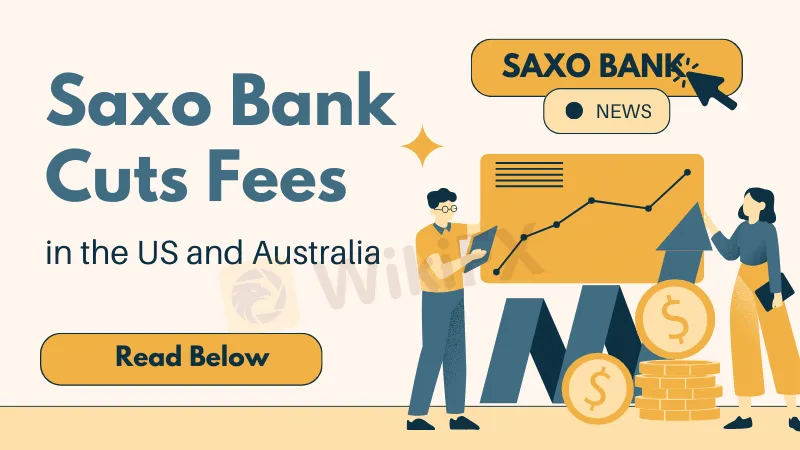简体中文
繁體中文
English
Pусский
日本語
ภาษาไทย
Tiếng Việt
Bahasa Indonesia
Español
हिन्दी
Filippiiniläinen
Français
Deutsch
Português
Türkçe
한국어
العربية
Good News: Saxo Bank Cuts Fees in the US and Australia
Abstract:Saxo Bank cuts fees in the US and Australia, making investing affordable & accessible. Up to 87% off in US, 62% off in Australia, lower currency conversion fees & more.

Saxo Bank, a major player in the investment world, has recently made an exciting announcement. They're cutting down their brokerage fees significantly for both US and Australian markets. This change is great news for investors, especially those in Australia, as it makes investing more affordable and straightforward.
The new pricing from Saxo Bank is pretty impressive. If you're trading in the US market, the fees have been slashed by up to 87%, which means you could be paying as low as $1 for trading US stocks. For Australian investors trading on the ASX, fees have been reduced by up to 62%, with costs as low as AUD 3.

But that's not all. Saxo Bank is also reducing fees for a range of other financial products like ETFs, Options, and Futures. For example, if you're trading futures in Australian dollars, you could see savings of up to 70%.
Another big change is in currency conversion fees. Saxo Bank has cut these by two-thirds, now down to only 0.25%. This is great for global traders as it makes investing in different currencies much cheaper. Plus, Saxo clients can keep money in 11 different currency accounts, which makes managing international investments a lot easier.

The CEO of Saxo Australia, Adam Smith, explained that the bank is really focused on making investment easier and more accessible, especially given the current tough economic conditions. Lower fees mean more people can start investing and keep their investments going.
Saxo Bank's approach to fees is now more competitive and transparent. They've set a low standard fee for ASX equities and have made their currency conversion fees clear and predictable.

Kim Fournais, the Founder & CEO of Saxo Bank, highlighted the importance of being able to invest across different markets and products. He mentioned that with these lower fees, it's easier and more attractive for investors to diversify their portfolios, which is essential for profitable investing.
In conclusion, Saxo Bank's decision to reduce fees in the US and Australian markets is a big win for investors. It makes trading more affordable and accessible, encouraging a wider range of people to invest and diversify their portfolios. This move by Saxo Bank is not only good for current investors but also opens doors for new ones, making the investment world a more inclusive place.

Disclaimer:
The views in this article only represent the author's personal views, and do not constitute investment advice on this platform. This platform does not guarantee the accuracy, completeness and timeliness of the information in the article, and will not be liable for any loss caused by the use of or reliance on the information in the article.
Read more

Is Your Zodiac Sign Fated for Stock Market Success in 2025?
The idea that astrology could influence success in the stock market may seem improbable, yet many traders find value in examining personality traits linked to their zodiac signs. While it may not replace market analysis, understanding these tendencies might offer insights into trading behaviour.

Kraken Offers $105 Fee Credit for FTX Fund Recipients
Kraken offers $105 in trading fee credits to FTX fund recipients, enabling $50,000 in crypto trading on Kraken Pro with zero fees. Secure your funds today!

Good News Malaysia: Ready for 5% GDP Growth in 2025!
Malaysia's economy is on track to sustain its robust growth, with GDP expected to exceed 5% in 2025, according to key government officials. The nation's economic resilience is being driven by strong foreign investments and targeted government initiatives designed to mitigate global economic risks.

Oriental Kopi’s IPO: Worth the Buzz or Not?
Kopi Holdings Bhd, a café chain operator under the brand Oriental Kopi, is gearing up for its listing on the ACE Market of Bursa Malaysia. The company has garnered a positive valuation from Mercury Securities Sdn Bhd, which has assigned a fair value of 68 sen per share, citing strong earnings growth potential driven by outlet expansions and increasing contributions from fast-moving consumer goods (FMCG) sales.
WikiFX Broker
Latest News
Bitcoin in 2025: The Opportunities and Challenges Ahead
BI Apprehends Japanese Scam Leader in Manila
Join the Event & Level Up Your Forex Journey
Is There Still Opportunity as Gold Reaches 4-Week High?
Bitcoin miner\s claim to recover £600m in Newport tip thrown out
Good News Malaysia: Ready for 5% GDP Growth in 2025!
FXCL Lucky Winter Festival Begins
Warning Against MarketsVox
Is the stronger dollar a threat to oil prices?
Rising Risk of Japan Intervening in the Yen's Exchange Rate
Currency Calculator






